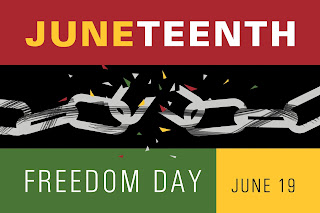Juneteenth Observance
“Juneteenth has never been a celebration of victory or an acceptance of the way things are. It’s a celebration of progress. It’s an affirmation that despite the most painful parts of our history, change is possible and there is still so much work to do.”- Barack Obama.
Racial tension continues to dominate post slavery societies in The Americas a century and a half after the abolition of slavery. In many spaces in the United States of America a racist and calculated campaign is currently being waged to erase the history, achievements and culture of the African Americans. The constant attack on the black culture reminds us that the struggle concerning civil rights is far from over. The war on the black culture should serve as a catalyst for succeeding generations regarding their awesome responsibility to push back on the divisive counter culture. Juneteenth is therefore the prefect springboard to mobilize that next generation of freedom and civil rights advocates to ensure that the gains made are not eroded. Juneteenth should not be viewed only as a Federal holiday; the day should be seen as a rallying cry for African Americans to think about the meaning of freedom as well as that hefty price that was extracted for that. Juneteenth must be interrogated as that reflective point in the nation’s history, and as well serve as a site for political knowledge and expediency, especially on the eve of another presidential election. Juneteenth should remind the black community that now is the time to register to vote. There is no better time for African Americans to engage or perhaps re-engage with the political process and this undoubtedly has implications for generations to come. Freedoms fought for should never be taken for granted. Unfortunately, too many African Americans are complacent as it relates to their history. This attitude of complacency serves the agenda of the oppressors and those oppressive laws which are meant to curtail the progress of people of colour. Juneteenth also has important lessons and significance for those of us with black skin living outside the United States. The day offers an opportunity for reflection on our journey of enslavement and colonization. The day also affords us the chance to infuse our collective consciousness and intellect to tackle critical development issues in the various spaces we find ourselves, given the importance this will have on succeeding generations.
What is Juneteenth?
Juneteenth, a blend of the words June and nineteenth, honors the end of slavery in the United States of America. Juneteenth takes place on June 19th every year and commemorates the end of slavery in the United States. Specifically, it commemorates the day (June 19th, 1865) that Union soldiers finally made it to Galveston, Texas to tell enslaved people that the war was over and they were now free. It does not commemorate Lincoln’s Emancipation Proclamation, which had become official U.S. law on January 1st, 1863, but was not fully implemented to all until the order was read to enslaved people all the way in Texas two and a half years later. Many plantation owners held enslaved people captive long after the proclamation, or intentionally fled westward to avoid approaching Union forces who would inform them of their free status. Juneteenth is the twelfth federal holiday in the United States of America. President Joe Biden signed the legislation in 2021. Juneteenth gives a national voice to the voiceless both past and present, and represents courage, bravery, resistance and resilience.
Juneteenth Importance.
Following the killing of George Floyd, a 46-year-old Black man who died in the custody of the Minneapolis Police in May 2020, thousands of people around the United States poured onto the streets in protest. The activism and advocacy surrounding Floyd’s murder became a rallying cry for legislative change across the United States of America effectively re-energizing the Black Lives Matter movement. Democrats in Congress responded by unveiling sweeping legislation targeting misconduct and racial discrimination by the police. Any observance of Juneteenth is incomplete without paying tribute to Albert Ely Edwards who is widely referred to as the father of Juneteenth. Born on March 19th, 1937, Albert Ely Edwards dedicated his political career to championing Black causes, such as bringing attention to the significance of Juneteenth to all Americans. In an effort to have the US Congress officially recognize the day as a federal holiday, Edwards collaborated with state legislative bodies around the country to get the law passed at the state level over many decades. Edwards passed away April 2020 at the age of 83.
How is Juneteenth Celebrated?.
For decades, many southern Black communities were forced to celebrate Juneteenth on the outskirts of town due to racism and Jim Crow laws. To ensure they had a safe place to gather, Juneteenth groups would often collectively purchase plots of land in the city on which to celebrate. These parks were commonly named Emancipation Parks; many such parks are still in existence today. The National Park Service (NPS) invites celebrants to commemorate Juneteenth at their nearby national parks. Juneteenth has regained popularity and is often celebrated with food and community. It also has helped raise awareness about ongoing issues facing the African-American community, including a political fight for reparations, or compensation, to the descendants of victims of slavery. The original observances of Juneteenth included prayer meetings and the singing of spirituals, and wearing new clothes as a way of representing their newfound freedom. Juneteenth is typically commemorated with prayer and religious services, speeches, educational events, family gatherings and picnics, and festivals with music, food, and dancing.
As we observe Juneteenth we must be mindful that the day reinforces that freedom and racial equality have always been a hard-fought battle for black Americans, a battle that is on-going. Juneteenth should be viewed as an opportunity to learn more about the history of enslaved African Americans, as well as reflect upon the progress that has been made since the total abolition of slavery.
Happy Juneteenth!
In the words of Al Edwards, freedom is worth celebrating. This is a day to take pride in our culture and history.
Wayne Campbell is an educator and social commentator with an interest in development policies as they affect culture and or gender issues.
waykam@yahoo.com
@WayneCamo
©
#Juneteenth #FreedomDay




We should embrace Juneteenth as a day to celebrate our progress as a people and celebrate the struggles and triumphs of every generation.
ReplyDeleteThere also needs to be more knowledge sharing surrounding Juneteenth observances given that some in the community are unaware of the significance.
ReplyDelete